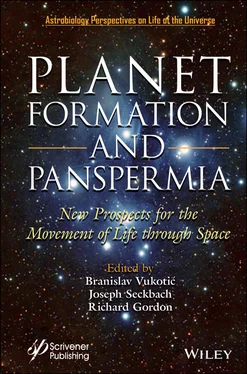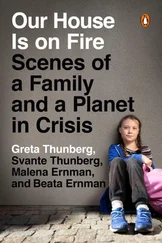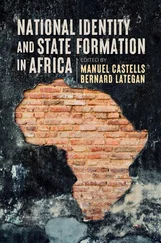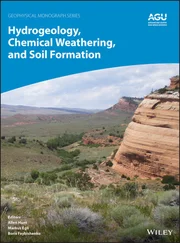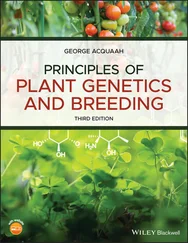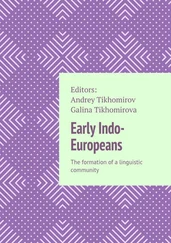Planet Formation and Panspermia
Здесь есть возможность читать онлайн «Planet Formation and Panspermia» — ознакомительный отрывок электронной книги совершенно бесплатно, а после прочтения отрывка купить полную версию. В некоторых случаях можно слушать аудио, скачать через торрент в формате fb2 и присутствует краткое содержание. Жанр: unrecognised, на английском языке. Описание произведения, (предисловие) а так же отзывы посетителей доступны на портале библиотеки ЛибКат.
- Название:Planet Formation and Panspermia
- Автор:
- Жанр:
- Год:неизвестен
- ISBN:нет данных
- Рейтинг книги:3 / 5. Голосов: 1
-
Избранное:Добавить в избранное
- Отзывы:
-
Ваша оценка:
- 60
- 1
- 2
- 3
- 4
- 5
Planet Formation and Panspermia: краткое содержание, описание и аннотация
Предлагаем к чтению аннотацию, описание, краткое содержание или предисловие (зависит от того, что написал сам автор книги «Planet Formation and Panspermia»). Если вы не нашли необходимую информацию о книге — напишите в комментариях, мы постараемся отыскать её.
Audience
Planet Formation and Panspermia — читать онлайн ознакомительный отрывок
Ниже представлен текст книги, разбитый по страницам. Система сохранения места последней прочитанной страницы, позволяет с удобством читать онлайн бесплатно книгу «Planet Formation and Panspermia», без необходимости каждый раз заново искать на чём Вы остановились. Поставьте закладку, и сможете в любой момент перейти на страницу, на которой закончили чтение.
Интервал:
Закладка:
Joseph Seckbach
September 1, 2021
References
[1.1] Afanasiev, V.L., Kalenichenko, V.V., Karachentsev, I.D., Detection of an intergalactic meteor particle with the 6-m telescope. Astrophys. Bull ., 62, 4, 301–310, 2007.
[1.2] Arrhenius, S., Worlds in the Making; the Evolution of the Universe, Harper, New York, 1908.
[1.3] Berzelius, J.J., Analysis of the Alais meteorite and implications about life in other worlds. Ann. Chem. Pharm ., 10, 134–135, 1834.
[1.4] Chyba, C.F., Extraterrestrial amino acids and terrestrial life. Nature , 348, 6297, 113–114, 1990.
[1.5] Gordon, R., Are we on the cusp of a new paradigm for biology? The illogic of molecular developmental biology versus Janus-faced control of embryogenesis via differentiation waves. BioSystems (Waves Fertilization, Cell Division Embryogenesis, Guest Editors: Jack Tuszynski, Luigia Santella & Richard Gordon), 203, 104367, 2021.
[1.6] Gordon, R. and McNichol, J., Recurrent dreams of life in meteorites, in: Genesis - In the Beginning: Precursors of Life, Chemical Models and Early Biological Evolution , J. Seckbach (Ed.), pp. 549–590, Springer, Dordrecht, 2012.
[1.7] Gurzadyan, V.G., Kolmogorov complexity, string information, panspermia, and the Fermi paradox. Observatory , 125, 1189, 352–355, 2005.
[1.8] Guzik, P., Drahus, M., Rusek, K., Waniak, W., Cannizzaro, G. and Pastor-Marazuela, I., Initial characterization of interstellar comet 2I/Borisov. Nat. Astron ., 4, 53–57.
[1.9] Kelvin, L., On the Origin of Life. Excerpt. From the Presidential Address to the British Association for the Advancement of Science , held at Edinburgh, 1871, https://zapatopi.net/kelvin/papers/on_the_origin_of_life.html.
[1.10] Lem, S., His Master’s Voice , Northwestern University Press, Evanston, Illinois, USA, 1999.
[1.11] Loeb, A., Extraterrestrial: The First Sign of Intelligent Life Beyond Earth , Houghton Mifflin Harcourt, Boston. Massachusetts, USA, 2021.
[1.12] McNichol, J. and Gordon, R., Are we from outer space? A critical review of the panspermia hypothesis, in: Genesis - In the Beginning: Precursors of Life, Chemical Models and Early Biological Evolution , J. Seckbach (Ed.), pp. 591–619, Springer, Dordrecht, 2012.
[1.13] Ott, E., Kawaguchi, Y., Kölbl, D., Rabbow, E., Rettberg, P., Mora, M., Moissl-Eichinger, C., Weckwerth, W., Yamagishi, A., Milojevic, T., Molecular repertoire of Deinococcus radiodurans after 1 year of exposure outside the International Space Station within the Tanpopo mission. Microbiome , 8, 1, 150, 2020.
[1.14] Persson, D., Halberg, K.A., Jørgensen, A., Ricci, C., Møbjerg, N., Kristensen, R.M., Extreme stress tolerance in tardigrades: surviving space conditions in low earth orbit. J. Zool. Syst. Evol. Res ., 49, 90–97, 2011.
[1.15] Raulin-Cerceau, F., Maurel, M.C., Schneider, J., From Panspermia to bioastronomy, the evolution of the hypothesis of universal life. Origins Life Evol. Biosphere , 28, 4-6, 597–612, 1998.
[1.16] Stan-Lotter, H., Survival of subsurface microbial communities over geological times and its implication for astrobiology, in: Model Ecosystems in Extreme Environments [MEET, Volume 2 in series: Astrobiology: Exploring Life on Earth and Beyond, series editors: Pabulo Henrique Rampelotto, Richard Gordon & Joseph Seckbach] , J. Seckbach and P.H. Rampelott (Eds.), pp. 169–188, Elsevier B.V., Amsterdam, 2019.
[1.17] T., N., Israeli Beresheet Spacecraft Allegedly Brought Microscopic Organisms to the Moon, Possibly Taking Over, Tech Times, New York, USA, 2020, https://www.techtimes.com/articles/255393/20201227/israeli-beresheet-spacecraft-allegedly-brought-microscopic-organisms-moonpossibly-taking.htm.
[1.18] Wikipedia, Search for extraterrestrial intelligence, https://en.wikipedia.org/wiki/Search_for_extraterrestrial_intelligence,2020.
1
“On the Origin of Life”
By Lord Kelvin (William Thomson)
Excerpt.From the Presidential Address to the British Association for the Advancement of Science; held at Edinburgh in August, 1871 Reprinted in Kelvin’s Popular Lectures and Addresses, p. 132-205. (Bracketed additions are from reprint.)
[p. 197.]
Think now of the admirable simplicity with which Tait’s beautiful “sea-bird analogy,” as it has been called, can explain all [?] these phenomena.
The essence of science, as is well illustrated by astronomy and cosmical physics, consists in inferring antecedent conditions, and anticipating future evolutions, from phenomena which have actually come under observation. In biology the difficulties of successfully acting up to this ideal are prodigious. The earnest naturalists of the present day are, however, not appalled or paralysed by them, and are struggling boldly and laboriously to pass out of the mere “Natural History stage” of their study, and bring zoology within the range of Natural Philosophy. A very ancient speculation, still clung to by many naturalists (so much so that I have a choice of modern terms to quote in expressing it) supposes that, under meteorological conditions very different from the present, dead matter may have run together or crystallised or fermented into “germs of life,” or “organic cells,” or “protoplasm.” But science brings a vast mass of inductive evidence against this hypothesis of spontaneous generation, as you have heard from my predecessor in the Presidential chair. Careful enough scrutiny has, in every case up to the present day, discovered life as antecedent to life. Dead matter cannot become living without coming under the influence of matter previously alive. This seems to me as sure a teaching of science as the law of gravitation. I utterly repudiate, as opposed to all philosophical uniformitarianism, the assumption of “different meteorological conditions”—that is to say, somewhat different vicissitudes of temperature, pressure, moisture, gaseous atmosphere—to produce or to permit that to take place by force or motion of dead matter alone, which is a direct contravention of what seems to us biological law. I am prepared for the answer, “Our code of biological law is an expression of our ignorance as well as of our knowledge.” And I say yes: search for spontaneous generation out of inorganic materials; let any one not satisfied with the purely negative testimony of which we have now so much against it, throw himself into the inquiry. Such investigations as those of Pasteur, Pouchet, and Bastian are among the most interesting and momentous in the whole range of Natural History, and their results, whether positive or negative, must richly reward the most careful and laborious experimenting. I confess to being deeply impressed by the evidence put before us by Professor Huxley, and I am ready to adopt, as an article of scientific faith, true through all space and through all time, that life proceeds from life, and from nothing but life.
How, then, did life originate on the Earth? Tracing the physical history of the Earth backwards, on strict dynamical principles, we are brought to a red-hot melted globe on which no life could exist. Hence when the Earth was first fit for life, there was no living thing on it. There were rocks solid and disintegrated, water, air all round, warmed and illuminated by a brilliant Sun, ready to become a garden. Did grass and trees and flowers spring into existence, in all the fulness of ripe beauty, by a fiat of Creative Power? or did vegetation, growing up from seed sown, spread and multiply over the whole Earth? Science is bound by the everlasting law of honour, to face fearlessly every problem which can fairly be presented to it. If a probable solution, consistent with the ordinary course of nature, can be found, we must not invoke an abnormal act of Creative Power. When a lava stream flows down the sides of Vesuvius or Etna it quickly cools and becomes solid; and after a few weeks or years it teems with vegetable and animal life; which, for it, originated by the transport of seed and ova and by the migration of individual living creatures. When a volcanic island springs up from the sea, and after a few years is found clothed with vegetation, we do not hesitate to assume that seed has been wafted to it through the air, or floated to it on rafts. Is it not possible, and if possible, is it not probable, that the beginning of vegetable life on the Earth is to be similarly explained? Every year thousands, probably millions, of fragments of solid matter fall upon the Earth—whence came these fragments? What is the previous history of any one of them? Was it created in the beginning of time an amorphous mass? This idea is so unacceptable that, tacitly or explicitly, all men discard it. It is often assumed that all, and it is certain that some, meteoric stones are fragments which had been broken off from greater masses and launched free into space. It is as sure that collisions must occur between great masses moving through space as it is that ships, steered without intelligence directed to prevent collision, could not cross and recross the Atlantic for thousands of years with immunity from collisions. When two great masses come into collision in space it is certain that a large part of each is melted; but it seems also quite certain that in many cases a large quantity of debris must be shot forth in all directions, much of which may have experienced no greater violence than individual pieces of rock experience in a land-slip or in blasting by gunpowder. Should the time when this Earth comes into collision with another body, comparable in dimensions to itself, be when it is still clothed as at present with vegetation, many great and small fragments carrying seed and living plants and animals would undoubtedly be scattered through space. Hence and because we all confidently believe that there are at present, and have been from time immemorial, many worlds of life besides our own, we must regard it as probable in the highest degree that there are countless seed-bearing meteoric stones moving about through space. If at the present instant no life existed upon this Earth, one such stone falling upon it might, by what we blindly call natural causes, lead to its becoming covered with vegetation. I am fully conscious of the many scientific objections which may be urged against this hypothesis, but I believe them to be all answerable. I have already taxed your patience too severely to allow me to think of discussing any of them on the present occasion. The hypothesis that [some] life [has actually] originated on this Earth through moss-grown fragments from the ruins of another world may seem wild and visionary; all I maintain is that it is not unscientific, [and cannot rightly be said to be improbable.]
Читать дальшеИнтервал:
Закладка:
Похожие книги на «Planet Formation and Panspermia»
Представляем Вашему вниманию похожие книги на «Planet Formation and Panspermia» списком для выбора. Мы отобрали схожую по названию и смыслу литературу в надежде предоставить читателям больше вариантов отыскать новые, интересные, ещё непрочитанные произведения.
Обсуждение, отзывы о книге «Planet Formation and Panspermia» и просто собственные мнения читателей. Оставьте ваши комментарии, напишите, что Вы думаете о произведении, его смысле или главных героях. Укажите что конкретно понравилось, а что нет, и почему Вы так считаете.
